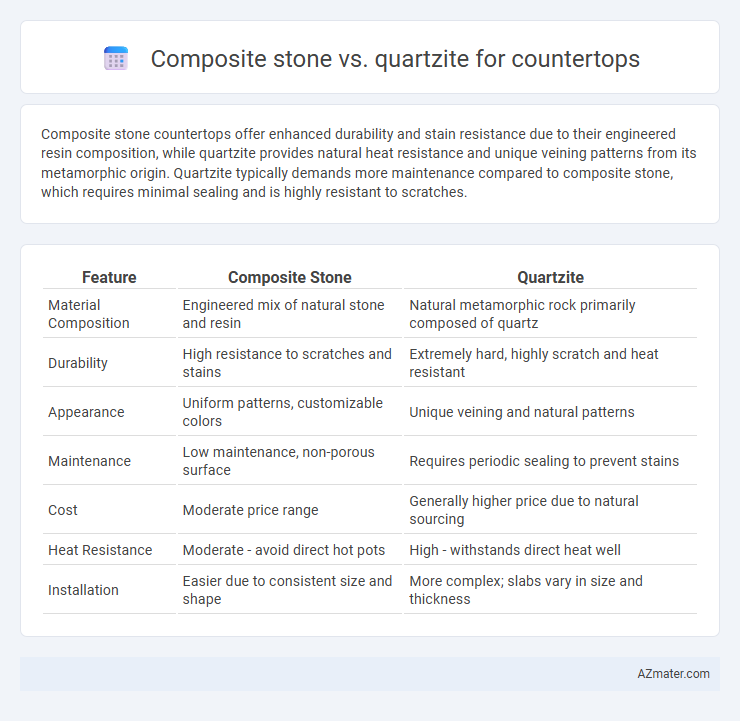Composite stone countertops offer enhanced durability and stain resistance due to their engineered resin composition, while quartzite provides natural heat resistance and unique veining patterns from its metamorphic origin. Quartzite typically demands more maintenance compared to composite stone, which requires minimal sealing and is highly resistant to scratches.
Table of Comparison
| Feature | Composite Stone | Quartzite |
|---|---|---|
| Material Composition | Engineered mix of natural stone and resin | Natural metamorphic rock primarily composed of quartz |
| Durability | High resistance to scratches and stains | Extremely hard, highly scratch and heat resistant |
| Appearance | Uniform patterns, customizable colors | Unique veining and natural patterns |
| Maintenance | Low maintenance, non-porous surface | Requires periodic sealing to prevent stains |
| Cost | Moderate price range | Generally higher price due to natural sourcing |
| Heat Resistance | Moderate - avoid direct hot pots | High - withstands direct heat well |
| Installation | Easier due to consistent size and shape | More complex; slabs vary in size and thickness |
Introduction to Countertop Materials
Composite stone countertops offer a versatile and cost-effective alternative, combining crushed natural stones with resin to create durable surfaces resistant to stains and scratches. Quartzite, a natural metamorphic rock, provides exceptional hardness and heat resistance, making it a premium choice for kitchen countertops with a unique, natural appearance. Both materials deliver distinct benefits in terms of aesthetics and performance, catering to varied preferences in countertop design and functionality.
What is Composite Stone?
Composite stone, also known as engineered stone, is a man-made material composed of crushed natural stone bonded together with resins and pigments, offering durability and a consistent appearance ideal for countertops. It combines approximately 90% quartz particles with polymers that enhance strength, making it resistant to scratches, stains, and heat. Unlike natural quartzite, composite stone provides a broader range of colors and patterns while requiring less maintenance, making it a popular choice for kitchen and bathroom surfaces.
Understanding Quartzite Countertops
Quartzite countertops offer exceptional durability and natural beauty, making them a premium choice for kitchen surfaces. Unlike composite stone, which is engineered from crushed stone and resin, quartzite is a natural metamorphic rock, prized for its resistance to heat, scratching, and etching. Its unique crystalline structure provides a striking aesthetic with veining and patterns similar to marble but with greater hardness, ideal for high-traffic countertop areas.
Appearance and Design Options
Composite stone countertops offer a wide range of vibrant colors and uniform patterns, making them ideal for creating contemporary, sleek kitchen designs. Quartzite, a natural stone, features unique veining and a more organic, sophisticated look with subtle color variations that add depth and character. The versatility of composite stone supports bold design choices, while quartzite's natural beauty caters to timeless, elegant aesthetics.
Durability and Strength Comparison
Composite stone countertops offer exceptional durability due to their engineered composition, combining natural quartz with resins and polymers for enhanced strength and resistance to scratches and stains. Quartzite, a natural metamorphic rock, provides impressive hardness and heat resistance but can be more prone to chipping and requires periodic sealing to maintain its surface integrity. When comparing longevity, composite stone generally outperforms quartzite in resilience against daily wear and impacts, making it a preferred choice for high-traffic kitchen environments.
Maintenance Requirements
Composite stone countertops require minimal maintenance, as they are non-porous and resistant to stains, scratches, and heat, making them ideal for busy kitchens. Quartzite, while extremely durable and heat-resistant, demands periodic sealing to prevent staining and maintain its natural beauty. Regular cleaning with mild detergent and avoiding harsh chemicals are essential for both materials to ensure longevity and appearance.
Resistance to Stains and Scratches
Composite stone countertops offer superior stain resistance due to their non-porous surface, preventing liquids from penetrating and causing discoloration. Quartzite, a natural stone, is more prone to stains unless properly sealed and maintained regularly. In terms of scratch resistance, quartzite ranks high, showcasing durability similar to granite, while composite stone also provides excellent scratch resistance thanks to its engineered hardness.
Cost Comparison: Composite Stone vs Quartzite
Composite stone countertops typically cost between $50 to $100 per square foot, offering a more budget-friendly option compared to quartzite, which ranges from $70 to $150 per square foot due to its natural stone origin and durability. Installation expenses for composite stone tend to be lower, as the material is easier to cut and handle, whereas quartzite requires specialized tools and expertise. Long-term value also differs, with quartzite's higher initial investment often offset by its superior hardness and resistance to scratches, potentially reducing maintenance costs over time.
Environmental Impact and Sustainability
Composite stone countertops often have a lower environmental impact than quartzite, as they are made from recycled materials and engineered resins that reduce quarrying waste. Quartzite, a natural stone, requires extensive mining and processing, leading to higher carbon emissions and habitat disruption. Choosing composite stone supports sustainability by minimizing resource depletion and promoting material reuse.
Which Countertop Material Suits Your Needs?
Composite stone countertops offer a versatile and durable surface combining natural stone with resins, making them resistant to stains, scratches, and heat, ideal for busy kitchens requiring low maintenance. Quartzite, a natural metamorphic rock, provides exceptional hardness and a unique, natural appearance with heat resistance but may require periodic sealing to prevent stains. Choosing between composite stone and quartzite depends on your preference for natural aesthetics versus ease of care and the level of durability needed for your countertop use.

Infographic: Composite stone vs Quartzite for Countertop
 azmater.com
azmater.com